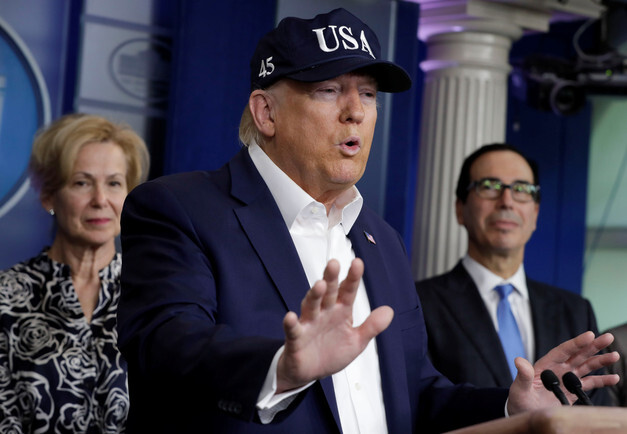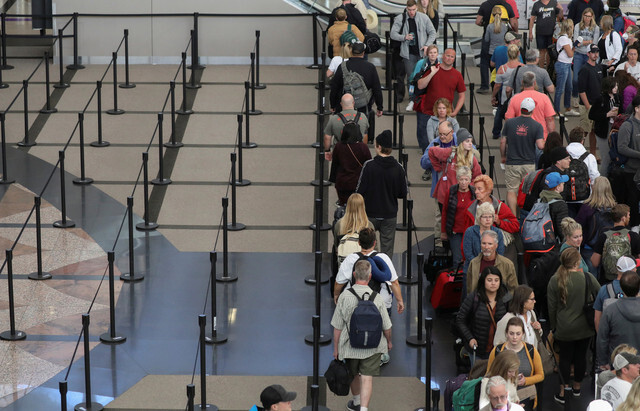hankyoreh
Links to other country sites 다른 나라 사이트 링크
[Editorial] As virus spreads overseas, preventative measures against reverse transmissions are vital

Novel coronavirus infections are spreading throughout the world at a fast rate. The US declared a national emergency as the number of people diagnosed approached 3,000. In Europe, countries like Spain, France, Germany, and the United Kingdom have followed Italy in adopting all-out measures to prevent further contagion amid a sharp rise in diagnoses, including declaring national emergencies, prohibiting restaurant operations, and closing schools.
This explosive rise in infections within the international community is deeply worrying. Another question is what impact it will have on the situation in South Korea, where the number of new diagnoses per day has somewhat stabilized, dropping off to double digits as of Mar. 15. This seems to be a moment that calls for close observation and preemptive disease control measures by the government.

Disease prevention authorities should be paying closer attention to the fact that a number of confirmed diagnoses in the past have emerged among South Korean and foreign nationals arriving from places like Europe and the US. If we don’t take proper action to prevent a reverse transmission of the virus from overseas, all our efforts to contain community infections at home could be in vain.
That said, we should also be cautious about going so far as to close the door completely with entry bans. Overseas research findings show that the entry bans cannot be expected to do much more than to delay the spread for a few days. It’s also not something that can be seen as a positive solution in light of South Korea’s dependence on trade for survival. We can’t make it our policy goal to be the “world’s only clean country” when contagion is raging around the globe.
Our priorities now would seem to involve shoring up trust in our disease prevention system, which despite some difficulties has been gradually managing to control community infections, as we weigh efforts to step up quarantining and stop the virus from entering from overseas. As of Mar. 15, the government has applied or expanded special entry procedures for five countries, including Spain, but it’s also worth considering expanding the scope of countries as needed and beefing up the quarantine procedures.
It goes without saying that international cooperation becomes all the more critical at times like this. The Blue House’s proposal to the White House on Mar. 15 to hold a video conference among G20 leaders was a significant step. It was also good to see South Korea and China working to exchange information through a video conference a few days ago. We look forward to seeing communication with even more countries on areas such as quarantine procedures, exchanging clinical data, and vaccine and treatment development.
It’s also time for the Foreign Ministry to show its diplomatic acumen by working actively to explain to the international community how the South Korean situation has been improving recently and convince countries that have imposed entry restrictions on South Korean travelers that they can remove them now.
Please direct comments or questions to [english@hani.co.kr]

Editorial・opinion
![[Column] Season 2 of special prosecutor probe may be coming to Korea soon [Column] Season 2 of special prosecutor probe may be coming to Korea soon](https://flexible.img.hani.co.kr/flexible/normal/500/300/imgdb/original/2024/0426/3317141030699447.jpg) [Column] Season 2 of special prosecutor probe may be coming to Korea soon
[Column] Season 2 of special prosecutor probe may be coming to Korea soon![[Column] Park Geun-hye déjà vu in Yoon Suk-yeol [Column] Park Geun-hye déjà vu in Yoon Suk-yeol](https://flexible.img.hani.co.kr/flexible/normal/500/300/imgdb/original/2024/0424/651713945113788.jpg) [Column] Park Geun-hye déjà vu in Yoon Suk-yeol
[Column] Park Geun-hye déjà vu in Yoon Suk-yeol- [Editorial] New weight of N. Korea’s nuclear threats makes dialogue all the more urgent
- [Guest essay] The real reason Korea’s new right wants to dub Rhee a founding father
- [Column] ‘Choson’: Is it time we start referring to N. Korea in its own terms?
- [Editorial] Japan’s rewriting of history with Korea has gone too far
- [Column] The president’s questionable capacity for dialogue
- [Column] Are chaebol firms just pizza pies for families to divvy up as they please?
- [Column] Has Korea, too, crossed the Rubicon on China?
- [Correspondent’s column] In Japan’s alliance with US, echoes of its past alliances with UK
Most viewed articles
- 1‘We must say no’: Seoul defense chief on Korean, USFK involvement in hypothetical Taiwan crisis
- 2Why Kim Jong-un is scrapping the term ‘Day of the Sun’ and toning down fanfare for predecessors
- 3Two factors that’ll decide if Korea’s economy keeps on its upward trend
- 4After election rout, Yoon’s left with 3 choices for dealing with the opposition
- 5BTS says it wants to continue to “speak out against anti-Asian hate”
- 6AI is catching up with humans at a ‘shocking’ rate
- 7Noting shared ‘values,’ Korea hints at passport-free travel with Japan
- 8Gangnam murderer says he killed “because women have always ignored me”
- 9South Korea officially an aged society just 17 years after becoming aging society
- 10Ethnic Koreans in Japan's Utoro village wait for Seoul's help